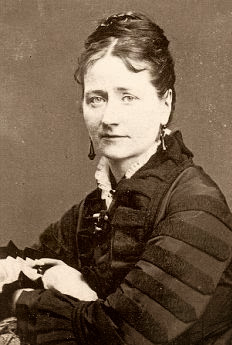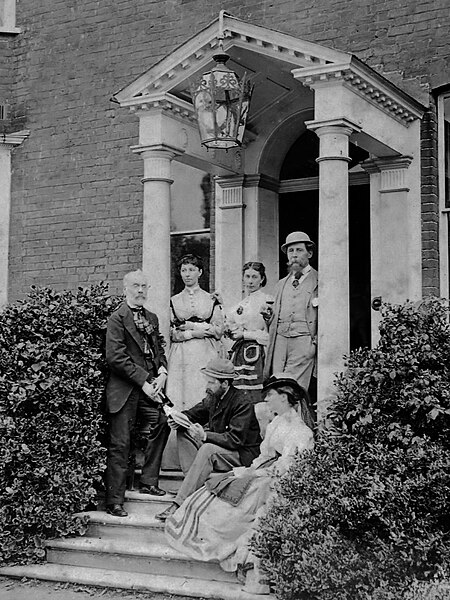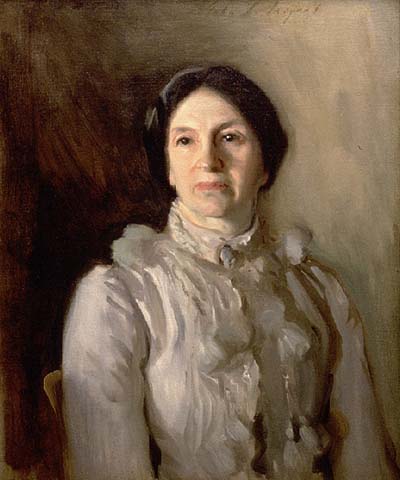Georgina Hogarth and Annie Adams Fields: Dickens’s most trusted female friends
This post is contributed by Christine Skelton: Emeritus Professor, University of Birmingham, U.K. Her book, “Charles Dickens and Georgina Hogarth: a curious and enduring relationship” is published by Manchester University Press, and was released in April 2023.
Charles Dickens had several women friends but the one dearest to him was his sister-in-law, Georgina Hogarth. For twenty-eight years Georgina lived with Dickens. He regarded her as his “best and truest friend,” and trusted her enough to leave her all his private papers, together with his most treasured personal possessions, and made her one of the joint executors of his will and guardian of his youngest son.[i] Another close female friend was Annie Adams Fields, a literary hostess, author and social reformer who was the wife of his Boston publisher, James Fields. Describing her in a letter to Georgina as “one of the dearest little women in the world,” Dickens felt sufficiently comfortable with Annie that, when he was on the American reading tour of 1867-8, he broke his usual rule of never staying with friends to reside with the Fieldses at their home on Charles Street, Boston.[ii] Annie and James, were among the few people who Dickens confided in about his love for Ellen Ternan. When Georgina and Annie met for the first time in London in May 1869, they immediately struck up a bond, with both women holding an almost reverential regard for Dickens. In fact, just before the Fieldses arrived on their tour of Europe, there was a rumour going around that Annie had fallen in love with Dickens.[iii]

Georgina and Annie started corresponding immediately and continued to do so for the next forty-four years. Although Annie’s letters to Georgina have not survived, her diaries reveal what she thought about Georgina and her place in Dickens’s home. On the one hand Annie had “the deepest respect for her” recognising that it was not easy “to live near such a man, to love him, to desire to do for him”.[iv] Yet, Annie was uneasy about a single woman living with a married man whose wife had been banished to another house. She was not alone. Following a lunch party at her home where some of Dickens’s friends, including the actor Charles Fechter and poet Henry Wadsworth Longfellow, were discussing his home life, Annie observed that “not one mentioned [Georgina’s] name; they could not dare, I suppose (lest they might do her wrong)”.[v] She added “I never felt more keenly [Georgina’s] anomalous and unnatural position in the household”.[vi] When she met up with Charles Fechter after the publication of Dickens’s will, he told her how shocked he was at the contents, saying that Dickens’s words and the substantial personal and financial legacy he left Georgina gave “colour to the senseless and cruel accusations against Miss Hogarth”.[vii] Despite her support for Georgina, Annie was not comfortable with the situation. In his analysis of Annie’s diaries, George Curry remarks that although she “prized her friendship with Miss Hogarth” she “had some reservations about her role in the situation”.[viii]

When reading through the women’s correspondence for my book Charles Dickens and Georgina Hogarth: a curious and enduring relationship, a significant finding was that Georgina could be open and honest on some quite intimate matters yet extremely cautious when there was no genuine need to be. For example, Georgina and Annie openly discussed the depth of their grief at the loss of Dickens. Annie was deeply upset by Dickens’s passing, commemorating the anniversaries of his birth and death by sending flowers for Georgina to lay on his grave in Westminster Abbey (and privately she upheld the date on which he said his last farewell to her). Georgina’s distress far outweighed Annie’s. Perhaps referring back to the scandal of her rumoured affair with Dickens, Georgina told Annie that she felt it was a “hard, hard trial” having “to try to take an interest in life for the sake of the people” around, more so because “it must all be borne and kept to myself’”.[ix] While willing to express her own emotions and state of mind, even though the information could be snapped up by the newspapers and used as evidence that perhaps she was rather too fond of her brother-in-law, Georgina would shut down or side-step anything that could bring Dickens’s name into disrepute, such as any mention of Ellen Ternan.

Annie undoubtedly knew about Dickens and Nelly. When Dickens left on his return to England in 1868, she rejoiced that “He goes to the English spring, to his own dear ones, to the tenderness of long tried love,” and a few days later, as the boat drew near to Liverpool, “I cannot help rehearsing in my mind the intense joy of his beloved”.[x] A diary entry the following year is less vague as to who this loved one is; writing about Dickens’s poor health during his reading tour of Britain in 1869, “only Nelly observed that he staggered and his eye failed, only she dared to tell him”.[xi] Further proof that Annie knew about Nelly came two months after Dickens’s death when she recorded “J[ames] told Longfellow, as was quite right, about E.L.T.“[xii] The following year Annie reported that she had heard of “N.T. being in Rome … I feel the bond there is between us … I wonder if we shall ever meet”.[xiii] Georgina would have been fully aware that Annie knew about Nelly but chose to keep her own contact with her a secret. When visiting Nelly in Margate, Georgina referred vaguely to visiting “a friend”; that same “kind friend” who helped her copy out Dickens’s letters when compiling an edited collection and was also the “invalid friend” she had to call on regularly after an operation.[xiv]
There was to be no discussion of Catherine Dickens either. The impression Annie had was that Catherine drank too much: “[Dickens] told J. yesterday in walking that nine out of ten of the cases of disagreement in marriage came from drink he believed. He is a man who has suffered evidently”.[xv] Annie would gently probe Georgina about Dickens’s wife but she refused to be drawn, declaring “As to my sister – it is a subject I don’t want ever to say much upon.”[xvi] The little she did say conveyed a disdain for Catherine. Like Dickens, Georgina refused to use Catherine’s name, referring instead to she/her, “his wife” or, as just quoted, even “a subject”.[xvii] When Sydney Dickens died in 1872, Georgina was initially more compassionate, revealing that the news “has been a great grief to my sister, Sydney’s mother … and the shock was very terrible, poor thing”.[xviii] Annie’s response to Catherine’s grief however, generated a tetchy response from Georgina who implied that sympathy was wasted on her sister: “She has felt this as much as she can feel anything – I believe – but she is a very curious person – unlike any one else in the world – and I feel from the way you write that you have an entirely mistaken idea of the state she is in. – Naturally, as you don’t know her.”[xix] When Annie asked about the chapter on Charles’ and Catherine’s separation in Forster’s Life, Georgina went on the defensive: “What I feel to be hard is that proper justice cannot be done to Charles while it is imperative (as, of course it is in her life time) to give no picture of his wife – and to make no comment on the peculiarities of her character, which – if they could be fairly set against his would I think require no comment – and would be an explanation for a great deal.”[xx] Georgina’s interpretation is somewhat ironic given that the only version of the marital breakdown the general public had heard was Dickens’s.

no reference, taken from Katey Dickens photo album, 1866.
Although rare, Annie and Georgina both gave instances where they were critical of Dickens’s behaviour. Dickens was staying at Annie’s home when two visitors arrived, friends of James Fields’s junior partner, asking if they might see the author. On hearing their request, a surprised Annie recorded his response: ‘“No I’ll be damned if I will’ he said, like a spoiled child starting up from his chair!”[xxi] She excused Dickens’s reaction, reasoning that he might be ill. Georgina implied that she would try and coax rather than confront her mercurial tempered brother-in-law on the occasions when she felt she needed to tell him off. She reported to Annie how Dickens’s celebration of food and drink in his books and speeches was condemned so often in reviews that “I have sometimes laughingly begged him not to speak about his dinners – in a joking way he had [as] certain stupid people […] did not understand him”.[xxii] Similarly, she reminded him to watch what he said in front of those he could not trust:
I often had to tell Charles that he was too open with many people – and too much in the habit of judging other men by himself – also that he did not remember how small things and sayings of his were noted down by those about him – to be used some day – and little jokes which he may have made without the smallest unkindness or idea of disloyalty to his friends, in moments of confidence – look and sound so different when they are seriously and maliciously written down.[xxiii]

Georgina and Annie were at the beginning of their grieving for Dickens in 1870, and not in a position to appreciate some of the amusing offshoots of his death. One of these was how Dickens’s departure was used by certain professions to promote their cause. A month after his death, Annie attended a church service in Boston to hear how the abstemious Dickens was re-cast as dependent on alcohol. The Reverend Justin Fulton, a staunch supporter of the temperance movement, preached to the congregation that “indulgence in drink killed him. Abstinence and rest might have given him two decades more of life. He tried these … but his old habit of life and work returned. His fuel was required to keep up the flame.”[xxiv] It was when Annie conveyed the contents of this sermon that an irritated Georgina confessed she had warned Dickens not to talk so much about his enjoyment of good wine and dinners.
By the end of the year, it was the turn of spiritualists. Annie had heard that during a séance a message had come through to one of the attendees, the brother-in-law of the poet Henry Wadsworth Longfellow. The medium claimed that Dickens wanted Longfellow’s brother-in-law to deliver the message to John Forster. Georgina did not know whether to laugh or cry at the idea that Dickens’s “spirit [was] condescending to communicate … through chairs and tables performing antics – and [moreover] sending utterly silly messages [was] utterly degrading”; besides, if “my dearest Charles wish[ed] to communicate with a friend on earth I am sure it would be possible for him to impress himself directly on [John Forster] – not on a woman on the other side of the Atlantic – who is to give the message to a slight acquaintance.”[xxv] Knowing how much Georgina disapproved of Dickens’s name being used to endorse spiritualism, it was by accident that thirteen years after his death, Annie inadvertently included an American newspaper article which she had cut out for her own scrapbook, in one of her regular letters. When she realised, Annie was apologetic saying she had not meant to send it, but Georgina was furious:
It annoyed me very much – and was all a lie! It was written by some one who professed to have had from Charles’ own lips! some most extraordinary revelations and confidences as to his (Cs) experiences of mesmerism and also his (Cs) avowal of himself as a spiritualist! Charles – a spiritualist! You know what his opinions were of all that imposture! Whatever [-] may be told by any one is a Lie – such as was told by this man in the newspapers about his receiving from Charles magnetized shirt fronts!! Collars etc! And some extraordinary stories about a lady in Sheffield! [who] also went through amazing visions and contortions under his “power”.[xxvi]
The majority of the letters are family news, but they also discuss the latest books and topical matters such as the Franco-Prussian war, and their competing attitudes to women’s suffrage (Annie for, Georgina against). Several letters discuss the actor Charles Fechter, who both women regard as a rogue but a very appealing one, describing him as “a most magnetic man – it is impossible to help being attracted by him.”[xxvii] In the early days they wrote to one another every six weeks and, given that a letter took at least two weeks to cross the Atlantic, shows the extent of their contact. As the years passed, the women’s correspondence became more sporadic. After 1884 Annie kept only those letters Georgina wrote in February and June, the anniversary dates of Dickens’s birth and death.[xxviii] James Fields died in 1881 and that same year Annie and the novelist and poet, Sarah Orne Jewett, moved in together. Annie died in 1914 aged 80, followed in 1917 by the 90 year-old Georgina.

Christine Skelton’s book, “Charles Dickens and Georgina Hogarth: a curious and enduring relationship” published by Manchester University Press, was released in April 2023 and available at regular bookshops including Waterstone’s and Barnes & Noble.
[i] Forster, John, The Life of Charles Dickens, London: Chapman and Hall, 1874, p.515.
[ii] Dickens to Georgina, 22 December 1867, The Pilgrim Edition of the Letters of Charles Dickens, ed. Madeleine House et al., Oxford: Clarendon Press, 1965-2002), XI, p. 518.
[iii] Chitty, Susan, The Beast and the Monk, a life of Charles Kingsley, London: Hodder and Stoughton, 1974, p.287
[iv] Annie Fields diaries, 8 June 1869, 25 April 1868. https://www.browningscorrespondence.com/fields-diary/
[v] Annie Fields diary 25 February 1870.
[vi] ibid
[vii] Annie Fields diary 30 August 1870.
[viii] Annie Fields diary 25 February 1870; Curry, G. ‘Charles Dickens and Annie Fields’, Huntington Library Quarterly, 51: 1 (1988), pp. 1-71.
[ix] Henry E. Huntington Library, Art Collections, and Botanical Gardens, San Marino, California, Annie Adams Fields Papers (hereafter Huntington Library), MS FI 2778, Georgina to Annie, 29 September 1870; MS FI 2703, 21 November 1870.
[x] Annie Fields diary 24 April 1868; 2 May 1868.
[xi] Annie Fields diary 8 June 1869.
[xii] Annie Fields diary 12 August 1870.
[xiii] Annie Fields diary 6 December 1871.
[xiv] Huntington Library, MS FI 2741, Georgina to Annie Fields, 30 October 1877; MS FI 2736, 27 February 1879; MS FI 2776, 17 March 1875.
[xv] Annie Fields diaries, 8 January 1868.
[xvi] Huntington Library, MS FI 2701, Georgina to Annie Fields, 5 August 1872.
[xvii] Huntington Library, MS FI 2715, Georgina to Annie Fields,30 August 1873; MS FI 2701, 5 August 1872.
[xviii] Huntington Library, MS FI 2707, Georgina to Annie Fields, 18 June 1872.
[xix] ibid
[xx] Huntington Library, MS FI 2715, Georgina to Annie Fields, 30 August 1873.
[xxi] Annie Fields diary 2 April 1868.
[xxii] Huntington Library, MS FI 2708, Georgina to Annie Fields, 18 August 1871.
[xxiii] Huntington Library, MS FI 2745, Georgina to Annie, , 15 May 1876.
[xxiv] Adrian, A. (1957) Georgina Hogarth and the Dickens Circle (London: Oxford University Press), p. 218.
[xxv] Huntington Library, MS FI 2710, Georgina to Annie Fields, 23 December 1870.
[xxvi] Huntington Library, MS FI 2756, Georgina to Annie Fields, 17 August 1883.
[xxvii] Georgina to Annie Fields, MS FI 2703, 21 November 1870.
[xxviii] There are 93 letters from Georgina dating from May 1869 to January 1913. The majority of these cover the years 1869-1883. Three years of correspondence are missing between Feb. 1884 and June 1887 and another five years between 1902 and 1906.

